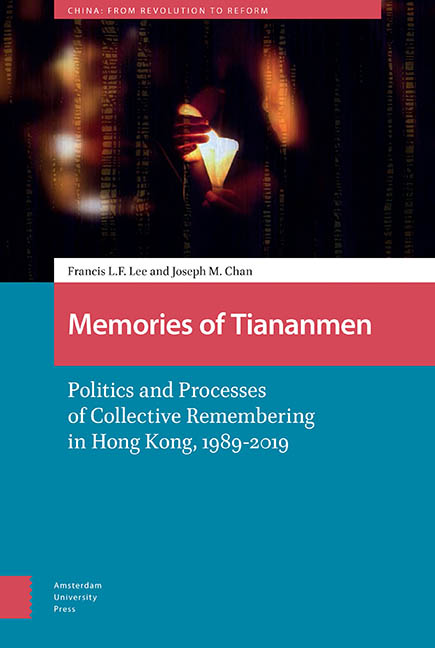Book contents
- Frontmatter
- Contents
- List of Figures and Tables
- Acknowledgments
- List of Abbreviations
- 1 Introduction
- 2 Memory Formation and the Valorization of Commemoration
- 3 Memory Mobilization
- 4 Intergenerational Memory Transmission
- 5 The Struggle for Memory Institutionalization
- 6 The Challenge of Localism and Memory Repair
- 7 Changing Attitudes toward Tiananmen?
- 8 Digital Media and Memory Balkanization
- 9 Conclusion
- Epilogue
- Appendix
- References
- Index
2 - Memory Formation and the Valorization of Commemoration
Published online by Cambridge University Press: 16 July 2022
- Frontmatter
- Contents
- List of Figures and Tables
- Acknowledgments
- List of Abbreviations
- 1 Introduction
- 2 Memory Formation and the Valorization of Commemoration
- 3 Memory Mobilization
- 4 Intergenerational Memory Transmission
- 5 The Struggle for Memory Institutionalization
- 6 The Challenge of Localism and Memory Repair
- 7 Changing Attitudes toward Tiananmen?
- 8 Digital Media and Memory Balkanization
- 9 Conclusion
- Epilogue
- Appendix
- References
- Index
Summary
Abstract
Chapter 2 focuses on collective memory formation. It first offers a narrative of the events in both Beijing and Hong Kong during the 1989 student movement in order to shed light on the production of an emotional imprint on Hong Kong people's mind. It then analyzes the characteristics of media representations of not only the Tiananmen crackdown but also the commemoration activities in Hong Kong. The analysis highlights the role of discursive valorization and scandalization of counter-commemoration discourses in the emergence, consolidation, and strengthening of collective memory of Tiananmen from the 1990s to the early 2010s.
Keywords: memory formation, emotional imprint, memory valorization, Scandalization
We pointed out in Chapter 1 that collective remembering of the Tiananmen crackdown in Hong Kong is a case of a socially dominant collective memory that is critical toward the political power holders. The formation and persistence of the collective memory cannot be understood in terms of a straightforward presentist perspective that emphasizes the capability of those in power to manipulate the society's understandings of the past to serve their present interests. Rather, the case can illustrate why and how a collective memory closely associated with the forces of political resistance can arise and persist.
Hong Kong itself boosts certain conditions that allowed the formation of collective memory of Tiananmen in the first place. To point out the most obvious one: Hong Kong had for a long period of time the freedom to publicly remember events that the state might prefer the society to forget. The 1989 student movement occurred in the middle of the “transition period” for Hong Kong, i.e., the period between the signing of the Sino-British declaration in 1984 and the eventual handover of sovereignty in 1997. In the last 15 years of the colonial era, the British government promoted democratization in the city in order to savor its legitimacy and plan for a “glorious retreat.” A political society came into being (Kuan, 1998). The society enjoyed high degrees of civil liberties, and values such as democracy and freedom acquired a dominant status in public discourses (Sum, 1995). The news media were professionalized, and journalists began to take up the liberal conception of the press as their normative self-understanding (So & Chan, 2007).
- Type
- Chapter
- Information
- Memories of TiananmenPolitics and Processes of Collective Remembering in Hong Kong, 1989–2019, pp. 47 - 84Publisher: Amsterdam University PressPrint publication year: 2021



